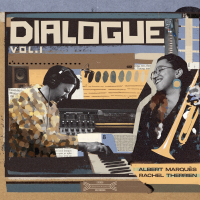Home » Jazz Articles » Album Review » Denis Colin Trio: Someting in Common
Denis Colin Trio: Someting in Common
At first glance, the Denis Colin Trio’s Something in Common would seem to ask this very question. A closer look reveals a more nuanced question, one that addresses what makes the music speak to so many while at the same time probes how the experiences of the African-American community are uniquely their own.
Colin and his trio examine the music’s spirit: what moves us, what feels familiar and what seems strange. The group’s repertoire fuses diverse streams of the African-American musical tradition. Wyclef Jean’s “Diallo” melds reggae and hip-hop with a folk sensibility; The Dirty Bandits mutate “If 6 Was 9” into a hip-hop/free-jazz chant; Pete LaRoca’s “Turkish Women at the Bath” becomes plaintive chamber jazz.
For three French players to interpret this material with the intent of examining black culture takes a big risk. Yet they keep the music from becoming derivative in a number of ways, most notably in instrumentation. Colin (bass clarinet) has retained his regular working band with Didier Petit on cello and Pablo Cueco on zarb (Persian goblet drum). By using instruments not immediately associated with black music, the trio at once distance themselves, allowing them to express their own identity, and retain the essence of their source material.
To directly express the pain and protest of black music, Colin brings in the gospel group The Steeles. On “Woman of the Ghetto,” Marlena Shaw’s diatribe against repressive government officials, the singers send their message across the cultural divide. As a listener standing on the other side (white and male), this song most keenly expresses the otherness of a different culture. I relate to the propulsive rhythm but not to a black woman demanding “How do you make your bread in the ghetto?” The music builds a bridge to understanding her plight.
Or so we'd like to think. A text accompanying the song credits reminds us, “Listen, try and understand... you’ll never get there.” The divide grows ever wider the closer we think we get to the other side; understanding remains a dim hope.
After this defeat comes the push to transcend, to leave behind the pain and the emptiness between us. Beaver Harris’ “African Drum Suite” induces trance, riding Mike Scott’s insistently riffing guitar and Colin’s pulsing moan of ecstasy and mourning.
They ride this wave into the final dramatic sequence of the album: Stevie Wonder’s “They Won’t Go When I Go” and Coltrane’s “Amen.” Lyrical and eloquent renderings both, they seek to wash away the preceding heartache. The Steeles turn Wonder’s tune into a piercing, impassioned gospel number, while the trio closes the album on a sacred, hymn-like note. They build to an ecstatic peak, with Colin turning the melody fragment into a bubbling, ambiguous phrase – is it mourning or praise?
Something in Common is a stirring experience that reaches beyond simple tribute or admiration. It is a testament to all that divides us, and to the hope that we attempt to cross the bridge of understanding, even if we never get to the other side.
Track Listing
1.Diallo 2.Jungoso 3.if 6 Was 9 4.Woman of the Ghetto 5.Blase 6.Turkish Women at the Bath 7.African Drum Suite 8.They Won't Go When I Go 9.Amen
Personnel
Denis Colin-bass clarinet; Didier Petit-cello; Pablo Cueco-zarb; Mike Scott-guitar; the Steeles- vocals; Gwen Matthews-vocals; Dirty Bandits-vocals; Wain McFarlane-vocals
Album information
Title: Someting in Common | Year Released: 2003 | Record Label: Nato/Universal
Tags
PREVIOUS / NEXT
Support All About Jazz
 All About Jazz has been a pillar of jazz since 1995, championing it as an art form and, more importantly, supporting the musicians who make it. Our enduring commitment has made "AAJ" one of the most culturally important websites of its kind, read by hundreds of thousands of fans, musicians and industry figures every month.
All About Jazz has been a pillar of jazz since 1995, championing it as an art form and, more importantly, supporting the musicians who make it. Our enduring commitment has made "AAJ" one of the most culturally important websites of its kind, read by hundreds of thousands of fans, musicians and industry figures every month.





















